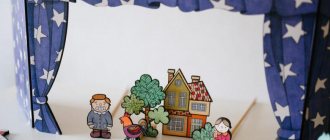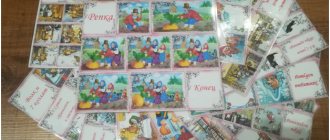Hello, dear mothers!
Today I want to tell you about how to usefully spend time at home with your baby. Thematic classes for children from one year old, what do they include and how can you study them?
You can have themed weeks or themed days. You can call it whatever you like and spend as much time as your baby wants.
Danilka and I spend themed weeks, but not 7 days a week, but 4-5 days. Because I see that he is bored with one topic and in a few days we will move on to the next one.
What are themed weeks?
Weeks like these bring together the immensity. More precisely, they include all types of children's activities and are aimed at ensuring that the child, first of all, finds it interesting, exciting, educational and asks for more such activities.
When conducting such classes, the child greatly expands his horizons, studies a certain topic in depth, and develops diversified. He fantasizes with his mother and, of course, plays.
A great way to develop early at home. You can invite friends, it will be even more fun and interesting.
Themed weeks can be spent with children from one year old to school. Accordingly, for kids we take very simple tasks, and for older children we complicate the tasks and introduce new age-appropriate exercises.
So it’s much easier for mom to do things, she doesn’t have to invent anything about what to do with her baby today.
Invent a magic box or a magic mailbox or a chest at home, as you wish.
In which you will put tasks for the whole week or for every day, unnoticed by the child.
This is great discipline. And the children will be excited about something new and interesting every day.
You can also leave surprises for your child in it, just be careful! Children get used to it very quickly and then, if the treasured surprise is not there, they begin to tear at this poor box and look inside every five minutes.
Thematic weeks, based on their name, are dedicated to a specific topic or holiday that should happen that week.
It turns out that you play a very interesting game for several days: either fly into space on Cosmonautics Day, or create magic during the Christmas holidays.
We give children a fairy tale and the opportunity to visit it, since modern children become adults very quickly and practically do not believe in miracles.
So a neighbor’s 3.5-year-old kid told me that there is no Santa Claus and that all this is an invention of adults! But what about the flight of fancy and expectation of a miracle?
In fact, it is not the topic itself that is interesting to children, although this also happens.
But mostly they enjoy the process, what is included in this week, what awaits them, what needs to be made, what to play.
Early childhood schools
You can develop your baby not only at home. Today, many early development schools have been created to help parents. They work using different methods and programs developed by teachers, doctors, psychologists and other specialists. Many have been developed and improved over many years. These schools employ qualified teachers who have studied these methods, have experience in working with children (and this is especially important for young mothers who have their first child) and most of them have a pedagogical education. Schools are equipped with educational materials (Zaitsev cubes, Montessori frames, natural materials, different types of letters and numbers, tables and much more), many have additional sports facilities (sports complexes, swimming pools, sports tracks, dry pools, etc.), in Some also offer music classes for the little ones. Therefore, of course, early development schools are wonderful assistants in a child’s education.
Age
In early development schools, there are usually several groups, each of which solves its own age-related problems and works according to a special program. They are formed by age or depending on the type of activity. So, for example, classes could be:
- from 0 to 6 months;
- from 5 to 10 months;
- from 9 months to 1.5 years.
As a rule, each group has its own age restrictions. At the same time, there is no definite answer when to start classes and where it is better to go. The decision is made by parents, taking into account the individual characteristics of the child, his desire to attend classes and the recommendations of doctors.
Types of activities
Classes in early development schools vary in time and duration; there are also weekend groups. If you have the opportunity to choose, then morning hours are best for studying. It is at this time that the child is full of strength and energy, and therefore will better perceive new information. If the child is under 3 years old, you need to exercise no more than 2-3 times a week for 40-60 minutes. If your child is older, you can increase both the time of classes and their frequency.
Classes are:
- individual, when the teacher works one-on-one with the child;
- group: one or two teachers work with a group of children;
- individual lessons with mother and baby (this is usually required if the baby is developmentally delayed or has health problems);
- “mother + baby”: classes are held in a group of children with their parents.
Before classes, the child should sleep well and eat.
Marina, 1.8 years old. At first, she cried constantly and refused to do anything. It turned out that the time of classes partially overlapped with the second sleep. And the girl was woken up early so as not to be late for the start of the lesson. When the class times were changed, Marina began to study with pleasure and now rushes to class herself.
“Advantages” of classes in early development schools
As we have already said, early development schools usually have a variety of developmental materials.
It makes no sense to buy such a large number of benefits for home. Firstly, it's expensive; secondly, it takes up a lot of space; and perhaps most importantly, they cater to a wide range of children based on age, interest and developmental level. Classes held in such groups are adapted specifically for children of a certain age. Most of the lessons take place in a playful way. After all, children perceive new knowledge best through play. It is very good if the classes contain different types of exercises: intellectual, musical, artistic, physical, etc. Kids still cannot concentrate on one activity for a long time, and they need a change of activity. The best option is to alternate exercises that require perseverance and attention with active movements. For example, when between intellectual classes there is a physical training session or a short dance warm-up.
By attending classes in an early development group, the child acquires new knowledge. As we have already said, until the age of 6-7 years, the educational process is easy for a child, brings pleasure and does not require additional motivation. But by studying at “school”, the child not only gains new knowledge, he learns to learn. The baby learns to set tasks for himself - albeit small, but so necessary (for example, to put another cube on his own, draw a circle, or simply put away the paints), think logically and draw his first conclusions. He trains his memory, develops fine and gross motor skills, and gradually, day by day, his concentration increases. And another very important point: the child learns to be independent.
A very important factor in favor of early development schools is social. From a very early age, children learn to communicate with each other, build relationships with “strange” adults, ask for help, resolve conflict situations and simply be friends. After all, what is a baby’s world at home is essentially the world of adults. Who surrounds the little man - moms, dads, grandparents, uncles and aunts who love him very much and are ready to do everything for him. And these adults make most of the decisions for the child. And even if somewhere on the playground a conflict situation arises between children or a controversial issue, it is usually decided by adults too. And when he finds himself in an environment where there are many children, the child learns to do it himself. And in general, we learn the art of communication all our lives, and the sooner our child begins to comprehend this difficult science, the easier it will be for him later. And one more pleasant moment: new friends appear not only among children, but also among their parents.
Veronica, 23 years old. “When Polinka was born, we moved to another area, where I didn’t know anyone, and I called my work friends less and less often: they have a balance sheet and a quarterly report, I have my daughter’s first steps and her first words... When Polinka turned one year old, we went to “mother + baby” classes, where mothers and children from 1 to 3 years old studied. And there I met people who had the same interests as me, and who were concerned about the same issues as me... It was nice to discuss together how children grow, what to feed or what is the best treatment, and also where we can go together go..."
“Disadvantages” of classes in early development schools
Perhaps one of the most significant disadvantages of early development schools is their cost. Unfortunately, very few of these schools are funded by the state or receive financial support from the municipality, and, as a rule, they are self-sustaining. Expensive rent of premises, purchase of materials, salaries of teachers and other expenses fall on the shoulders of parents. And therefore, the cost of such classes is often quite high.
In young children, immunity to infectious diseases is still poorly developed. And if someone in the group gets sick or does not receive treatment, then there is a high probability that other children will also become infected. Therefore, children often get sick during the first year. But gradually the body’s resistance to these viruses increases, which reduces the likelihood of subsequent illness.
The school is not always located close to home. And then the question arises: how to get there? A long journey is a big challenge for a child, and the difference between a car and public transport for a child is colossal. And if you can take a pleasant walk in September, then think about how you will get there in winter. Remember the doctors' recommendations: the maximum travel time should not exceed 20 minutes.
When children go to the same group, mothers involuntarily begin to compare the children's successes. As a result, they worry themselves (after all, there will always be someone who has succeeded more in something than your child). But it is especially bad when parents begin to point this out to the child, thereby taking the first steps towards the child developing an inferiority complex. It is important to remember that early development is not when your baby does something better than another child, but when he does something better than himself! Those. compared to what he would have been like if he had not been dealt with.
Unfortunately, some parents believe that attending classes in a preschool institution is more than enough, thereby completely shifting the responsibility for the upbringing and development of the child to the teacher. This is fundamentally wrong; not a single super-wonderful early development school can replace your communication with your child! Reading books, exciting walks, conversations, playing sports, and simply playing together - all this also affects the formation of the baby’s personality.
Composition of the theme week
These are the categories of tasks we include in our week. You can combine them so that you get 7 days or as many days as you want.
- information material (cartoons, presentations, music, videos, songs, audio stories, online games)
- fine motor skills (clothespin games, jigsaw puzzles, sensory boxes)
- gross motor skills (assembling from cubes, construction sets, playing with water)
- articulation gymnastics (finger and breathing exercises and games)
- speech development (books, flashcards, magazines with stickers, stories based on pictures, search books, poems, riddles, demonstration material)
- logic, attention, memory (puzzles, games: find a pair, find the differences, what is odd, who is hiding)
- creativity (applique, drawing, modeling, crafts)
- role-playing games, performances, performances
- experiments and observations
- outdoor outdoor games
- outdoor games at home
You can also plan to visit various places that are relevant to your topic. If your topic is architecture, for example, then you can visit unusual buildings in your city or an architectural museum, if there is one. Children's plays or movies.
The importance of developmental activities according to the Montessori system
In a small material it is not easy to cover the entire range of possibilities and discoveries for a child that the Montessori child development program offers. Developing comprehensively, the child gains practical life skills; through tasks, games and exercises, his sensory, speech apparatus, logical and creative thinking are improved.
However, the most important thing that a future schoolchild gains is internal independence, independence in choosing decisions, a willingness to work and achieve results and independently find and correct his mistakes - everything that is necessary for the formation of a full-fledged personality. It is no coincidence that all of the listed and other Montessori developmental activities are based on the key principle of this direction in pedagogy: “Help me do it myself.”
Preparing a thematic week
- Choosing a topic
- We collect concepts that it can include, based on the age of the child. For example, the theme Mother Winter: for children from 1 to 2 years old, you can include such concepts as: snow, snowflakes, snowman, slide, sleigh, Christmas trees. From 2 to 3 years old, add the following: warm clothes, blizzard, blizzard, winter games: snowballs, hockey, skiing, skating, etc.
- Now we select tasks according to the given categories. You can search the Internet for a topic that interests you, or look for ready-made themed weeks.
- Your scheme is simple: Theme - how I will talk about it - how I will show it - how I will play it
Why do we need children's development tools?
Let’s try to break down the generalized answer that we gave above “on the shelves” - this will be useful for parents when creating a developmental environment at home.
- Every new educational game, both in the subject and in the logical part, gives the child new “food” for the mind.
- Activities of this type help the child develop comprehensively (fine motor skills, speech, coordination of movements, logical thinking, creative imagination).
- The conditions set in the development program invariably outstrip the development of the baby’s abilities. It is as if he is gradually solving a new problem.
- By completing tasks independently and once again reaching the “ceiling” of their capabilities, the child develops most successfully.
- By playing educational games with their baby in the home environment, parents, perhaps without realizing it, learn themselves - patience, the need to provide the child with complete independence in choosing decisions and actions where he can and should do it himself. No “mentoring” - only communication and observation!
It is based on the child’s interest and natural desire for self-learning.
It is important for fathers and mothers to remember: they should not force a child to play - just set him an interesting game situation, give him a “beacon”. There are many educational toys of a very different nature, and if the child refuses one, offer him another. At the same time, and by their nature, it is better to alternate such games, without getting hung up on similar and uniform ones, even if they are built according to the principle of steps. And, what is also important, the child himself sets the pace and rhythm of the lesson and has the right to stop it. You should not insist on continuation, so that the child does not lose interest in it and does not carry it out “through force.”
Age-related developmental features
In accordance with the Montessori program, educational games are focused on the age characteristics of children. And they are like this:
- A child’s speech development begins and continues intensively from 0 to 6 years. At 2-2.5 years of age there is a dynamic accumulation of vocabulary, at 3.5-4 years the use of speech becomes fully conscious, by 4-4.5 years he actively uses it to solve his problems, and at 5 years he learns to read (understand other people's thoughts).
- Active development of fine motor skills is typical for the period from 1.5 to 5.5 years. It is closely related to speech development. The child learns to manipulate small objects, comprehends the concepts of part and whole, and his logical thinking develops.
- Sensory senses (vision, hearing, smell, tactile perception) develop sensitively from birth to 5.5 years.
- Perception and establishment of order in behavior, in time, in the environment - from 0 to 3 years.
- Mastering various actions, physical, motor development is carried out in parallel with mental and sensory development, especially the active stage - from one to 4 years.
- The sensitive period of socialization, the assimilation of forms of communication with peers and elders are characteristic of the age from 2.5 to 6 years.
Early Years Education
High level of learning ability . This is the most important opportunity for activities with your baby. The child’s brain is forming, it is very plastic. Therefore, it is during this age period that the child acquires knowledge faster and more effectively than in other age periods.
However, a child cannot acquire all knowledge, but only that which is available to him at this age. In addition, the very form of presenting new knowledge and skills should be adequate for an early age. The speed of passing new material should also correspond to the age and individual capabilities of the child: you need to set a certain pace for the lessons, but you should not rush too much.
Therefore, classes with a child require a thoughtful selection of tasks that are adequate in content and level of difficulty, as well as compliance with the rules for conducting classes with young children. Our book will help you achieve a balance between the opportunities and limitations that accompany a child’s age (second year of life).
Game component of early development . The leading activity of a young child is object-based play. When organizing activities with your baby, it is very important to remember this. After all, if you do not take into account this feature of young children, it is almost impossible to correctly organize developmental activities and achieve impressive results. Let us outline several rules for creating a developmental environment for a child aged 1–3 years.
The baby should have a sufficient number and variety of items to play with: from entertaining toys to educational ones. Of particular importance are multifunctional toys - those with which you can perform many different play actions (matryoshka dolls, inserts, colored cubes, etc.).
In addition to toys, the child should have the opportunity to use a wide variety of household items for play, such as dishes, storage containers, etc. The items with which the child plays must meet a number of requirements:
- safety (for example, do not use sharp, glass, or excessively heavy objects);
- environmental friendliness (items must be made from environmentally friendly materials,
- quality (items must be durable, easy to use);
- novelty (on the one hand, you need to give the child new objects, and on the other hand, do not forget to remove old boring objects and toys, temporarily replacing them with others).
The role of an adult in the early development of a child . In light of the above, one of the tasks of an adult is to provide the child with a subject environment and a constant influx of new interesting objects: select good toys, repair or remove broken ones from use, from time to time put away boring toys, which, upon returning to the child in a few months, will be acquired again. the quality of freshness and novelty.
But the main role of an adult in a child’s objective play is joint activity with the baby. It is necessary to clearly understand that if an adult does not become an active participant or organizer of the child’s object-based play, a real play partner, he will not be able to recognize and assimilate the basic function inherent in the object and the method of acting with it. No educational interactive toys can replace an adult playing with a child - neither in significance, nor in the power of influence, nor in the result of the game, which is ultimately expressed in the child’s level of development, his competence in the environment around him and the world in general (of course, at the level of his age).
The process of a child mastering human speech is also completely built on imitation of an adult: we are given this opportunity by nature - to master speech and learn to actively use it in society, but this can only happen thanks to the people around the child.
Never refuse your child when he asks you to play with him. Don’t forget how quickly time flies: most of our important adult affairs can wait, but a child won’t wait, he needs to explore the world and develop here and now!
Gifts of civilization for a baby . Before you begin developmental activities with your child, you need to answer the question for yourself: what is education? This is the transfer of human experience from generation to generation.
The experience of humanity accumulated over thousands of years is not transmitted genetically, but only through training. Therefore, it is impossible to become a civilized person without a good education. We can say that a child is born a small animal and without special training with the help of other people will not become a person - it will be a little Mowgli in the concrete jungle. Understanding this allows us to realize the seriousness and importance of the issue of development and education of children.
A specialist who constantly works with children can, at one glance, distinguish a child who is not being treated from one who is being treated. The first one has a lack of initiative (after all, he is already accustomed to not paying attention to him), a bored look (the child cannot organize himself, come up with an interesting game, does not know how to get involved in the game that is offered to him), simple manipulations with toys (twirls in hands, knocks, throws, but does not really play, because only an adult can teach this), field behavior (this means that visual images lead the baby: having grabbed one object, he throws it and runs after another that hits in sight).
Kids who are properly trained are completely different: such a kid is full of enthusiasm (he already knows that during the lesson there will be many interesting and exciting games), he is demanding (the kid has experience interacting with an adult and knows what the adult can do, so he asks him a toy, demands to play with him, etc.), he is active and proactive in his knowledge of the world. This condition of the child is, of course, more troublesome for the parents, but good for the child. He is interested in life!!!
There is also a third category of children - those with whom they work, but do it incorrectly, without taking into account the physiological and psychological characteristics of their age.
If a child’s development is based on the type of schooling, and not in play, if they try to teach a child to write, read and count ahead of time, you can completely discourage the child from studying and cause a persistent negative attitude towards learning.
In this case, you need to immediately stop torturing the child, because such study will be of no use anyway. And then offer properly structured activities that meet the needs of his age.








